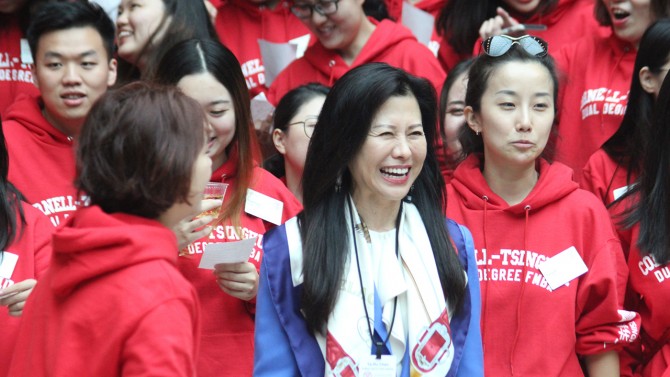For Chinese execs, Cornell-Tsinghua program offers best of both worlds
By Jonathan Miller
In 2016, Catherine (Zhi) Xu moved from Hong Kong to Shanghai to work in the asset management division of Credit Suisse. She was in her late 20s, had worked for UBS and Goldman Sachs, and was ready for a new challenge.
China had only recently allowed foreign-owned banks to offer asset-management services. Her job was to study the rules and regulations, learn how the market actually worked, and begin to develop a client base.
One of her first thoughts was that an MBA could help.
“My original idea was to find a program that gave me a lot of local knowledge,” she recalled. “When I found out about the Cornell-Tsinghua program, I realized it was exactly what I needed. It not only gives me the local expertise and exposure, but it gives me a chance to get to know Cornell and to see how an Ivy League university works. For me, it’s like two unique experiences together.”
Xu was speaking at a welcome event on Sept. 27 in the Dyson Atrium at the Cornell SC Johnson College of Business, where she and about 80 other students were beginning a 10-day stay. The group, fitted out in identical red sweatshirts, performed Cornell’s alma mater, posed for photos with the Big Red Bear and mingled with Cornell SC Johnson students and faculty.
“So far it’s been amazing,” beamed Ray (Ruihao) Min. Just 27, Min had developed and sold a mobile menu translation app in Los Angeles, worked on an autonomous driving project at Baidu, Inc., and was preparing for a consulting job with McKinsey & Company. “This program has already opened doors for me,” he said.
The Cornell-Tsinghua MBA/FMBA is a two-year, dual-degree graduate business program offered by Cornell SC Johnson and the PBC School of Finance at Tsinghua University, one of the top programs in China.
It is the only part-time, bilingual finance MBA program on the market for students with significant experience beyond the classroom, explained Ya-Ru Chen, academic dean for China initiatives and the Nicholas H. Noyes Professor of Management. It is also the first in mainland China to offer a degree from an Ivy League business school.
“We are not a training agency,” Chen said. “We are an educational institution that generates knowledge that will impact the way society operates.”
She said the program’s academic rigor is reflected in the quality of the students, many of whom are, like Xu and Min, rising stars at top companies in China.
“We have had students from Yale, Columbia, Oxford and Cambridge as well as from the best Chinese universities,” Chen said. “We recently accepted a student with a Ph.D. The caliber of the group is very high.”
Of the current class of more than 80 students, the average age is 31, and 50 percent are women. Although the program is just four years old, the alumni network is strong.
Min said that network is one of the reasons he applied – but not the only one.
“It’s not a social club,” he said. “I don’t think networks themselves are sufficient. I think the next leaders will need critical thinking, a strong knowledge base and resourcefulness in solving problems. I think this program really prepares its students for those capabilities.”
Classes are held on alternating weekends to accommodate the schedules of busy executives. Most of the classroom work takes place at Tsinghua University’s campus in Beijing, with courses taught by Tsinghua professors in Chinese, supplemented by occasional short courses taught by Cornell faculty in English. Xu, who is based in Shanghai, said she uses the bi-weekly visits to meet with clients in Beijing.
Students travel to the United States twice during the first year for intensive residential study periods, dividing their time between Cornell’s campuses in Ithaca and New York City. The four-day New York City visit includes participation in a “Wall Street Trek” and a hackathon.
Most of the U.S. time is spent on Cornell’s Ithaca campus.
“Everybody is amazed by the beauty of the campus and the quality of our air, but this is no vacation,” Chen said. “These students study every night until 2 or 3 o’clock. They’re in classes all day, then after dinner there’s a review session.”
She added, “The program is designed to educate the future generation of leaders in China whose focus may be the Chinese market, but who want a global perspective. Even if the core of what they do is in China, this gives them the ability to connect to the rest of the world. We provide perspective that the Chinese market needs.”
The formula seems to be working. Demand is growing steadily, even as business school options in China improve.
The benefits go in both directions, noted Mark W. Nelson, the Anne and Elmer Lindseth Dean of the Samuel Curtis Johnson Graduate School of Management. The students may be here to learn, he said, but they have much to offer in return.
“This is an opportunity for me to grow within my field as well as to teach,” he said at the welcoming event. “That’s an advantage of having a program like this. Not only does it enable us to reach a new set of students, but it also enhances what we as faculty know, and deepens our understanding of this critical region.”
Jonathan Miller is associate director for communications at the Mario Einaudi Center for International Studies.
Media Contact
Get Cornell news delivered right to your inbox.
Subscribe

